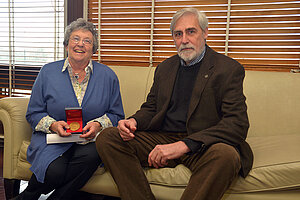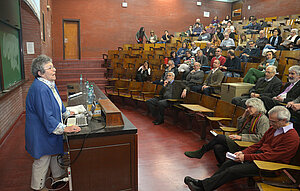Am 23. August 2016 wurde Prof. Dr. Silvia Braslavsky im Rahmen einer feierlichen Zeremonie am <link http: electroporation.net database-of-institutions university-of-buenos-aires-faculty-of-exact-and-natural-sciences external-link-new-window internal link in current>College of Exact and Natural Sciences (Facultad de Ciencias Exactas y Naturales) ein Ehrendoktortitel von der Universität Buenos Aires (Argentinien) für ihre wissenschaftliche Karriere und wesentlichen Einfluss auf die Zusammenarbeit zwischen der argentinischen und deutschen Wissenschafts-Community, verliehen.
Prof. Braslavsky kam im Oktober 1976 auf Einladung des damaligen Direktors <link internal-link internal link in current>Kurt Schaffner in die “Abteilung für Strahlenchemie im Max-Planck-Institut für Kohlenforschung“ (später Max-Planck-Institut für Strahlenchemie, heute MPI CEC). Sie wurde Forschungsgruppenleiterin und vertiefte ihre Forschung auf dem Gebiet der Photorezeptoren und wurde zur anerkannten Wissenschaftlerin im Bereich der Fotobiologie. Silvia Braslavsky setzte sich während ihrer Forschungsarbeit sehr erfolgreich für den Austausch zwischen deutschen und argentinischen Wissenschaftlern ein. Sie hielt die Beziehungen zu ihrem Heimatland Argentinien immer aufrecht und schaffte Brücken zwischen dem heutigen MPI CEC und ihrer Fakultät in Argentinien, die noch heute bestehen.
More about Prof. Braslavsky:
Silvia Braslavsky received her degree in Chemistry (Licenciada) from the same College in 1963 and was one of the more than 300 Professors and teaching assistants that resigned in August 1966, after the violent assault by the police forces to the College during the so-called “night of the long batons”. She did a post-doctoral stay in the US and returned to Argentina in 1972, where she was Associate Professor at the University of Rio Cuarto, but again left for political reasons in 1975, went to the US and Canada and in October 1976 to Mülheim an der Ruhr, Germany.
Since the recovery of Democracy in Argentina in 1983, she collaborated strongly with Argentinian research groups. She co-directed with Enrique San Roman a new research group on Photochemistry in the College of Sciences of the University of Buenos Aires and in 1988 was evaluator for a rebuilding Grant given by the GTZ (Gesellschaft für Technische Zusammenarbeit) to the Department of Inorganic, Analytic and Physical Chemistry in the college of Sciences. With the support of the MPG and other German Institutions (AvH, DFG, DAAD, VW Stiftung), between 1985 and 2007 when she retired, 10 Argentinian post-doctoral collaborators, two Argentinian graduate students and several short time guests (in addition to 43 post-doctoral fellows from 19 other Countries and several German and Spanish students) did research in her group in Mülheim an der Ruhr. She has co-authored more than 200 research papers and several book chapters. She has been active in the Scientific Community and was many years Chair of the IUPAC Commission and later Sub-Committee on Photochemistry. In 2000 she was the Scientific Chair of the IUPAC Photochemistry Symposium in Dresden and in 2014 the Scientific Chair and Organizer of the International Congress on Photobiology in Córdoba, Argentina.


